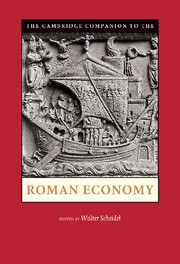Book contents
- Frontmatter
- Contents
- List of Figures
- Note on the Contributors
- Abbreviations
- The Roman world at the time of Marcus Aurelius
- 1 Approaching the Roman economy
- Part I Theory
- Part II Labor
- Part III Production
- 7 Raw materials and energy
- 8 Food production
- 9 Manufacturing
- Part IV Distribution
- Part V Outcomes
- Further reading*
- Bibliography
- Index
7 - Raw materials and energy
from Part III - Production
Published online by Cambridge University Press: 05 February 2013
- Frontmatter
- Contents
- List of Figures
- Note on the Contributors
- Abbreviations
- The Roman world at the time of Marcus Aurelius
- 1 Approaching the Roman economy
- Part I Theory
- Part II Labor
- Part III Production
- 7 Raw materials and energy
- 8 Food production
- 9 Manufacturing
- Part IV Distribution
- Part V Outcomes
- Further reading*
- Bibliography
- Index
Summary
Introduction
The extraction, supply, and trade in raw materials was of course fundamental to the non-agricultural sectors of the Roman economy. While the view that Roman trade was characterized more by the movement of raw materials than finished goods is wildly overstated, there was certainly a large trade in raw materials across the Roman world, with almost empire-wide distribution of materials from some sources. Long-distance trade in raw materials was of course a phenomenon that long pre-dated the Roman empire, with Bronze Age Aegean trade in copper ingots and raw glass represented in the fourteenth-century bce Uluburun wreck, and Phoenician trade in metals from Iberia to the Levant. Particularly noteworthy features of the Roman world are the direct state interest in and control of the extraction and supply of certain types of metal and stone; the corporate organization of specialist suppliers of some materials such as timber, and, in the glass industry, the overwhelming dominance of a small minority of sources of raw glass that supplied glass-blowing workshops all around the Mediterranean.
Metals
The Roman state took a strong interest in the mining of precious metals needed for the trimetallic currency used throughout the empire, either operating mines directly (under military supervision, and sometimes using slaves, condemned criminals, or tributary labor as part of the workforce), or by contracting operations to lessees. There is evidence for state control or supervision of the extraction of gold, silver, and copper; one might expect a similar interest in tin, the other main element in copper alloys, but there is no direct evidence. Lead, since it often occurs in the same ores as silver, was also often extracted under state control. In southern Britain (the Weald) it appears that iron was mined under the supervision of the Classis Britannica, probably on an imperial estate. Procuratores ferrararium for Gaul and Pannonia are attested in inscriptions.
- Type
- Chapter
- Information
- The Cambridge Companion to the Roman Economy , pp. 133 - 155Publisher: Cambridge University PressPrint publication year: 2012
- 7
- Cited by



